Pessimism of the Intellect, Optimism of the Whale
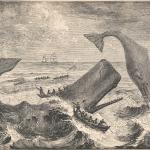
Some years ago — never mind how long precisely — I joined hundreds of other people at the New Bedford Whaling Museum’s Moby-Dick Marathon, a collaborative and continuous twenty-five-hour reading of Herman Melville’s opus, held yearly since 1997. The reading began in a tall, bright gallery containing a half-size replica whaling ship, abuzz and overflowing with people — clustered around the hull, squeezed onto the deck, and perched on the balcony for a view through the rigging.
“Call me Ishmael.” A cheer went up, and we were underway.
“The idea started with a docent named Irwin Marks,” said whaling museum director Amanda McMullen, describing the origins of the marathon. “He had seen a summer Moby-Dick readathon happening at Mystic Seaport and decided that New Bedford should be doing that because of where the story begins.” It has become a local institution: the mayor of New Bedford reads every year, and Massachusetts senator (and Green New Deal champion) Ed Markey was a reader in 2020.
We followed Ishmael across a cobblestone street and into the Seamen’s Bethel. Stone cenotaphs hung from the walls, empty graves each chiseled with the names of sailors lost at sea. We crowded into the pews, with the “low rumbling of heavy sea-boots among the benches, and a still slighter shuffling of women’s shoes.” A local priest appeared on cue, our own Father Mapple. He mounted the pulpit, reworked into a ship’s prow in the twentieth century to match the expectations of Moby-Dick fans. A somber organ led us through Melville’s whaling hymn, and the priest’s sermon on Jonah forewarned us of what was to follow: a disaster of Biblical proportions.
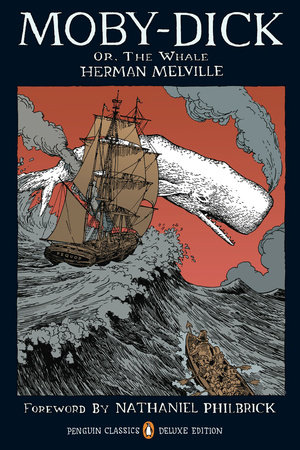
A Penguin Classics cover of Moby-Dick.
Moby-Dick defies simple reduction. It is at once deadly serious, hilariously camp, and ponderously existential. Melville grasps for kinship between his “isolatoes,” characters drawn from the many islands of the world. In tension and in tenderness, the shipmates create meaning with one another. Under the sting of command and enthralled by Ahab’s charisma, they work and live together aboard the Pequod — and ultimately fail to stop their captain’s drive to their common doom.
In its day — amid the disruptive expansion of capitalism and empire, the popular uprisings and reactionary retrenchments in Europe, and the ongoing conflict over chattel slavery and the looming US Civil War — Moby-Dick was poorly received. But its treatment of the annihilation of nature, its portrayal of labor and the despotism of the boss, and its critique of white supremacy and empire strike readers today as prophetic and resonant.
“Moby-Dick will either be universally burnt or be universally known in every language as the first comprehensive statement in literature of the conditions and perspectives for the survival of Western Civilization,” predicted Trinidadian socialist thinker C. L. R. James in 1953. For today’s socialists, amid accumulating catastrophes that cause the future itself to be in doubt, Moby-Dick offers a warning sign, a pressing question: What is to be done in the face of disaster?
All Astir
Retreating to the museum, readers took their place beneath an oversize painting of the New Bedford harbor, swapping in and out at intervals marked by a polite “thank you” from volunteers. Some read in different languages, others with thick New England accents. Veterans were easily identifiable by how they pronounced words like “gunwale” and “forecastle.” A few people truly performed, lending salt and gravel to the sailors’ voices, and eliciting occasional applause.
Most in the crowd brought their own copy of the book, following along while awaiting their turn at the microphone. I peered over a friend’s shoulder to admire the stunning woodcut prints in his Rockwell Kent illustrated edition. An elderly man settled in next to us, the handle of his walking cane carved and painted into a white whale — this was clearly not his (nor many in the crowd’s) first Melville. But as both real and fictional professors know, Moby-Dick continues to attract new generations of readers.
Speculative fiction author China Miéville — whose works include a young adult adventure inspired by Moby-Dick — told me that the “evasive surplus” that attracts him to the text has “something to do with the encyclopedic nature of the book, the sense that it is constantly straining against its own form, and against the form of literature, to encompass everything, to be a book that is not just ‘about’ but that sort of embodies everythingness. Obviously it fails, but it fails so magnificently.” Calling Moby-Dick “a work of outstanding ambition and genius,” Miéville encourages newcomers give it a try, even if intimidated by its length.
One easy entry point is the Moby-Dick Big Read, an audiobook project where a cast including Tilda Swinton, Benedict Cumberbatch, and Miéville himself take turns reading. Often, there is a playful connection between reader and theme.
David Attenborough tackles the chapter that contemplates the overhunting and extinction of whales. Tony Kushner breathlessly extracts all possible meanings out of “A Squeeze of the Hand,” the book’s most seminal chapter, wherein Ishmael and friends process spermaceti globules between their fingers. John Waters handles “The Cassock,” in which a few seamen create a protective vestment out of the skin of a whale’s “grandissimus” (his penis) to be worn by the mincer as he shaves the blubber bible-page thin.
This mincer might have made a good reader himself, for the pieces of blubber drop into the bin beneath him, “fast as the sheets from a rapt orator’s desk.”
Loose-Fish
We refueled with black coffee and bowls of free chowder in the lobby, compliments of a local clam shack. I gazed up at the skeleton of a blue whale, suspended from the ceiling. Oil from the bones dotted the lobby floor, a telltale reminder of this once sprawling and deadly industry.
“For God’s sake, be economical with your lamps and candles!” Ishmael implores, for “not a gallon you burn, but at least one drop of man’s blood was spilled for it.”
Whaling reduced an entire species to near extinction, and its human toll was far greater than could ever be accounted on the walls of a small chapel. Millions of people were pushed past the limit of exhaustion as whale oil greased cotton-spinning machines and lit up the factory floor, accelerating industrial production and lengthening the working day, and driving an intensified demand for cotton, for the labor of enslaved people, and for the seizure of indigenous land. Whale oil extraction set the stage and the pattern for the expansion of the fossil fuel industry, and for the key position it occupies in global capitalism today.
The world of exploitation and expropriation is never far from the storyline in Moby-Dick. A near-penniless Ishmael decides to ship out aboard the Pequod and accepts the tiniest share of the voyage’s uncertain proceeds. “Who ain’t a slave?” he asks rhetorically to justify his own submission to the whaling bosses.
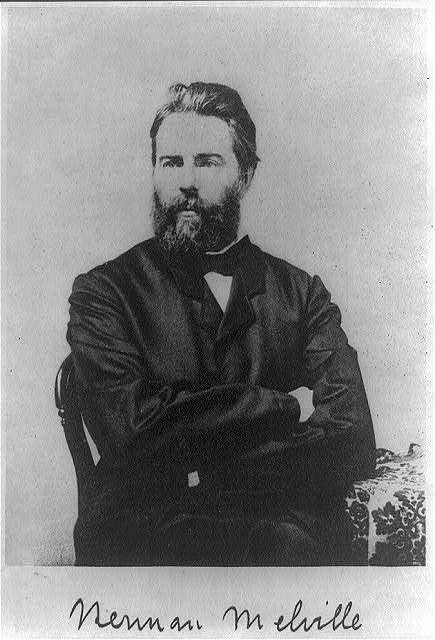
Herman Melville in 1860. (Library of Congress)
Later we hear the story of a group of “poor, sun-burnt mariners” who must surrender a whale they hunted to a nobleman because — under the rules of maritime law — “It is his.” These same rules (of “Fast-Fish and Loose-Fish”) come to justify England’s claim to India and the US seizure of Mexico.
Such interludes showcase what Cornel West argued in his 2004 book Democracy Matters: that Melville founded a tradition of “excoriating critique” of US imperialism, exposing “the martial ideas and monarchical principles hiding behind peaceful language and benign democratic rhetoric.” West builds on the earlier thought of Toni Morrison, who argued in “Unspeakable Things Unspoken” in 1988 that Moby-Dick finds Melville wrestling with the specter of white-supremacist ideology and its distorting effect on the social world. “It was the whiteness of the whale that above all things appalled me,” Ishmael confesses.
The “Midnight, Forecastle” scene, staged in the whaling museum’s auditorium by a local acting troupe, ends as a white sailor hurls racist insults at the African harpooner Daggoo; a violent storm looms above and between them, and Pip, the young black cabin boy, prays to a “big white God aloft there somewhere in yon darkness” for deliverance. Spoiler alert: the prayers go unanswered.
First Night-Watch
As the evening stretched into night, the marathon crowd thinned. Some kept a sorry watch: the first snore came at 9:43 p.m., as a man nodded off beneath a painting of a whale’s lonely, unblinking eye. We prodded ourselves awake with more coffee and the shock of cold January air on the museum’s roof deck, straining for a glimpse of the stars above the harbor lights. Just after 1 a.m., we passed the book’s midpoint and a small bottle of rum, split between our rinsed-out coffee cups.
This passage forms an inflection point for the book’s critique of white supremacy and slavery: we are hundreds of pages in, and the Pequod’s crew have just killed their first whale. Worn out from the hunt and from towing the whale back to the ship, most of them sleep. Second mate Stubb is hungry, and he commands two (of the book’s three) black characters to prepare him a whale steak: Daggoo is dispatched overboard to cut it from the carcass; the ship’s cook, an elderly black man named Fleece who Melville signals had been enslaved, must prepare the late-night meal.
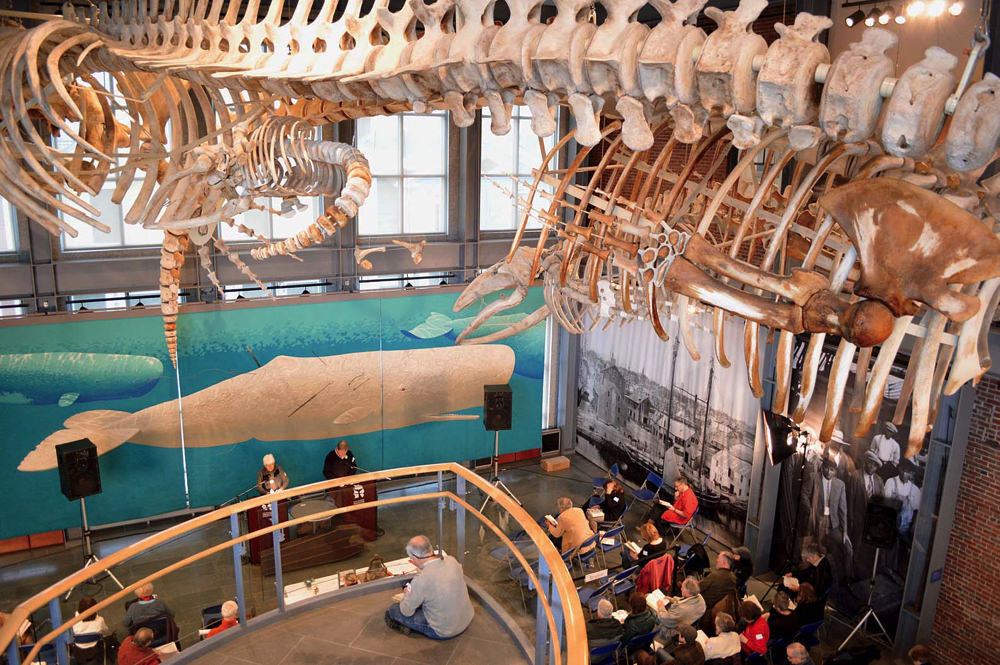
The New Bedford Whaling Museum’s Moby-Dick Marathon has been held yearly since 1997. (New Bedford Whaling Museum)
Stubb is dissatisfied with the cookery and berates Fleece, humiliating him by making him preach to the sharks. These sharks, Ishmael says, are also “the invariable outriders of all slave ships crossing the Atlantic”: feeding off the mass death of millions of enslaved African people during the Middle Passage, those who died or were killed aboard slave ships, or who jumped overboard to escape their horrid conditions. Forced to bow when dismissed, Fleece limps away and mutters to himself that Stubb is “more of a shark dan Massa Shark hisself.”
In Stubb’s character, we find an indictment of the hierarchies of power and the logics of racial capitalism. Earlier in the book, Ahab insulted Stubb with words hurtful enough that he was not sure if the captain kicked him. Yet Stubb never confronts Ahab, save in a dream where he learns that it is an honor to be “kicked by a great man . . . with a beautiful ivory leg.” Awake, he justifies his own subordination and traumatizes Fleece and others in turn. When Pip jumps from the boat in fright after the whale thump, Stubb threatens him with abandonment — reminding him that “a whale would sell for thirty times what you would, Pip, in Alabama.”
Dehumanized as value-generating property, valued far less than the animal being hunted or the commodity rendered from it, Pip eventually jumps again. After hours alone in the ocean’s vast expanse, he becomes psychically unmoored.
The Universal Thump
The narrative shifts to the industrial inferno of the tryworks, transforming the slaughtered whale into fuel. Our own energies began to flag. Rough passage through the small hours, confronting the limits of our aging bodies and their prolonged encounter with the unforgiving chairs. We tacked away from the rum and back to coffee, and took our shifts at the microphone, driving through the chapters with a deliberate cadence — the rhythmic feeling that flows from laboring with others toward a common end.
In the book, the labor of whaling is portrayed in vivid detail, disciplined and regimented. Its emancipation is doubtful; all the book’s potential mutinies are stillborn, from Starbuck’s contemplated assassination of Ahab to the play-within-the-play “The Town-Ho’s Story,” wherein a group of “sea-Parisians entrenched themselves behind the barricade” before their uprising is betrayed and crushed.
C. L. R. James wrestled with the fact that the ship’s crew — the protagonists in the title of his 1953 book Mariners, Renegades, and Castaways — are not just unable but also unwilling to revolt against Ahab. His quest instead becomes their own. Ever fascinated by the dynamics between leaders and masses, James writes that Melville’s experience working at sea let him observe “how men rationalized their subservience to tyranny,” as well as how tyrants adhered people to their purposes.
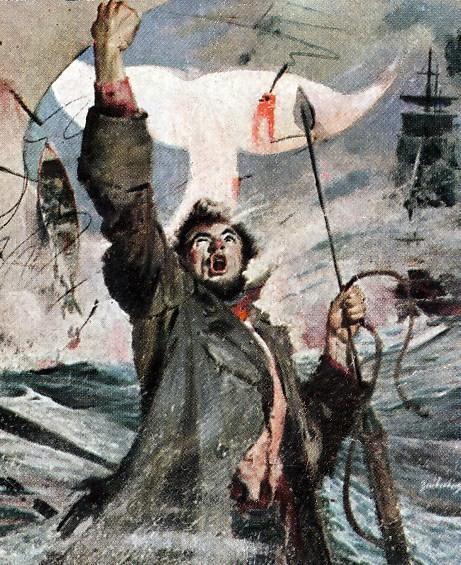
Moby-Dick‘s Captain Ahab.
Reading Moby-Dick in the era of Adolf Hitler and Joseph Stalin, James sees Ahab as “the most dangerous and destructive social type that has ever appeared in Western Civilization.” He argues that Melville’s genius was an almost-prophetic creative process, prefiguring twentieth-century totalitarians by perceiving both the disruptive world changes that would produce them and the disasters that would follow in their wake. For James, the core of Moby-Dick revolves around the key question of “how the society of free individualism would give birth to totalitarianism and be unable to defend itself against it.”
He levels a withering critique of the Pequod’s chief mates — who “represent competence, sanity, tradition” — and of their timid, faltering (and quite familiar) attempts to stop Ahab. It is as if they do not understand the stakes of the situation they find themselves in.
“Every protest,” James writes, “was followed by a capitulation.”
Noah’s Flood Is Not Yet Subsided
We pulled toward dawn. A batch of sugary Azorean malasadas appeared and just as quickly disappeared into the resurgent and well-rested morning crowd — ready for the final, fast-paced chase. I felt bleary and delirious, kin to Ahab as “lightning flashes through my skull; mine eye-balls ache and ache; my whole beaten brain seems as beheaded, and rolling on some stunning ground.”
We closed in on the whale — and it on us.
Moby-Dick constantly teeters on the brink of catastrophe: Pip’s oceanic abandonment, Tashtego’s near drowning inside a whale’s head, a mystery disease that almost kills Queequeg. The book threatens, again and again, that things could always get worse — until they finally do. Melville may have found absolution here, confessing to Nathaniel Hawthorne that “I have written a wicked book, and feel spotless as the lamb.” Hawthorne later remarked that Melville had “pretty much made up his mind to be annihilated.”
But what politics can emerge from despair? For Ishmael, journeys in pursuit of “those far mysteries we dream of” result in either “barren mazes” or a stove boat. The opening meditation on the human desire to draw close to water contrasts with the final curtain’s descent on Ishmael, adrift in the ocean, clinging to life atop his drowned lover’s empty coffin. Escape — as Melville himself once did in the Marquesas Islands — or the simple act of survival may be the best that any one person can hope for.
But what about all people? The catastrophes are upon us: all-consuming wildfires and rising tides, a resurgence of hard-right authoritarian political movements, and brutal inequalities that predated and have been compounded by an unrelenting pandemic. Billionaires race to rocket off-planet to avoid the fate to which they would condemn the rest of us (although, as Melville would have noted with some jouissance, so far they have mostly edged into space). Greater disasters loom, and we brace for each successive stormfront, afraid of losing power in a literal and figurative sense.
All is not yet lost, but Melville indicates how easily it could be.
Yet this frightening encounter might also be liberating, for we learn we cannot remain still: we need movement.
Socialists know that a better world is possible. At times, it can be comforting to believe that it is also preordained. The victory of the working class is inevitable, Karl Marx and Friedrich Engels once proclaimed in The Communist Manifesto. Reading Moby-Dick is disquieting because it takes the opposing view: the arc of the universe does not bend toward justice; instead, the ark is on its way to the bottom.
In my favorite passage, Ishmael describes how the whale-line threatens to ensnare those aboard the whale boat as it runs out behind the harpoon, with “its complicated coils, twisting and writhing around it in almost every direction.” The boat is the human condition, and we learn:
you cannot sit motionless in the heart of these perils, because the boat is rocking like a cradle, and you are pitched one way and the other, without the slightest warning; and only by a certain self-adjusting buoyancy and simultaneousness of volition and action, can you escape being made a Mazeppa of, and run away with where the all-seeing sun himself could never pierce you out.
All is not yet lost, but Melville indicates how easily it could be. Yet this frightening encounter might also be liberating, for we learn we cannot remain still: we need movement.
Socialists — like anyone else — ought to read Moby-Dick because it is an incredible work of literature. Its layers reverberate and disturb, holding up a mirror to our past and present. But unlike the book’s conclusion, our future is not yet composed. Buffeted by winds and waves, we still have choices to make and the ability to act, as more than isolatoes, to determine together how to steer and row ourselves toward a horizon that is hard to glimpse, never mind see beyond.
Our habitable world is being destroyed by massive forces that seem to operate beyond anyone’s control: monsters and morbid symptoms with which we must reckon. But rather than overwhelm us with despair, these warnings can spur action. Enveloped in whale-lines, the proverbial halters round our necks grow tighter — and yet we still yearn to breathe. We sound out to one another — for meaning, comradeship, illumination, passage — through the fog.
And as Ishmael reminds us while contemplating the interplay of the sun and the spraying mists of a spouting whale, “rainbows do not visit the clear air; they only irradiate vapor.”
Chas Walker worked for many years as a union organizer in Rhode Island. He is a doctoral student in political science at Boston University.
If you like this article from Jacobin, please support them with a subscription or donation.
